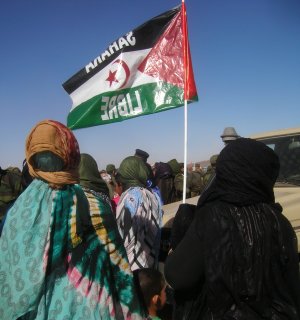OCTOBER 16, 2011 1 COMMENT
 Morocco’s Human Rights record in occupied Western Sahara has always been poor. But since the peaceful protest by ten of thousands of Saharawis (Western Sahara’s indigenous population) near El Aaiun in Moroccan-occupied Western Sahara in October last year– the so-called Gdeim Izik protest camp that was the largest ever protest in the occupied territories – this record is becoming increasingly poor.
Morocco’s Human Rights record in occupied Western Sahara has always been poor. But since the peaceful protest by ten of thousands of Saharawis (Western Sahara’s indigenous population) near El Aaiun in Moroccan-occupied Western Sahara in October last year– the so-called Gdeim Izik protest camp that was the largest ever protest in the occupied territories – this record is becoming increasingly poor.
On September 25 this year, Moroccan settlers and security forces again attacked peacefully protesting Saharawis, this time in Dakhla in occupied Western Sahara. Many were injured in these attacks, including women and children, and 28-year-old Saharwi activist Maichan Mohamed Lamin Lehbib was assassinated by Moroccan forces, according to the Saharawi liberation movement, Polisario.
And last Monday, October 10, Moroccan forces brutally attacked peaceful protesters in El Aaiun in the occupied territories. According to the Polisario, approximately 30 Saharawis were injured and many others arrested.
In Gdeim Izik, as in the other demonstrations, the protesters were intent on showing their frustration with the lack of progress in the so-called Western Sahara conflict, the plundering of their resources by Morocco, and the arduous and discriminatory conditions they live under. They have endured 36 years of illegal colonisation, abuse and discrimination by Morocco, as well as nearly twenty years of waiting for a referendum on the status of Western Sahara that is demanded by international law and promised by UN.
Moroccan forces clamped down heavily on the peaceful protest in Gdeim Izik, injuring many of the protesters, killing a 15-year-old Saharawi boy, Nayem Elgarhi, and imprisoning several of the participants.
According to Human Rights Watch and Amnesty International, the Moroccan authorities allegedly torture many of the Saharawis whom they have detained, the most common methods, according to Amnesty International’s 2011 report being “beatings, electric shocks and threats of rape.” The detainees are also often forced to sign confessions and brought before military courts on more or less trumped up charges.
Abba Malainin, Polisario’s representative to Denmark, tells Africa Contact that he is “very worried that the Moroccan authorities maintains their torture against the protesters, that they will not be given a fair trial and that their health situation is deteriorating.”
“There were twenty-three Saharawi human rights activists arrested after the crackdown against the protest camp, Gdeim Izik, last year. They are now in Sale prison near Rabat waiting to be presented to a military court,” Malainin says.
“One of these, Cheikh Banga, has been doing a hunger strike since 15 September. His life is in danger. Another, Sidahmed Lemjiyed, President of the Saharawi Committee for Protection of Natural Resources, was detained on 25 December 2010 in El Aaiún. Since then, he has been imprisoned without being accused of a crime and without having been before a court. According to an international group that visited Morocco this week, his health is deteriorating.”
But as Morocco maintains a virtual media blackout in occupied Western Sahara and has banned NGO’s from operating there, independent information about the situation in occupied Western Sahara is hard to come by.
“Morocco still banning the entrance to Western Sahara of the Media and Independent observers,” says Abba Malainin. “And Morocco has in the past few days banned an International human rights Delegation, the Spanish International Association for the Observation of Human Rights (AIODH), from visiting the imprisoned Saharawi human rights activists in Morocco. Also, Saharawis in occupied Western Sahara have no right to free expression or free association.”
Read more:
El Mundo, The Guardian, Amnesty International, BBC
The case for Western Saharan independence
Western Sahara media resources:
Sahara Press Service, press agency of the Saharawi Arab Democratic Republic (proclaimed Saharawi state of Western Sahara in exile)- http://www.spsrasd.info/en
Sahara Libre, news from Western Sahara – http://www.saharalibre.es/
ASVDH, news about HR-violations in occupied Western Sahara – http://asvdh.net/category/english
Reuters, Western Sahara – http://af.reuters.com/news/country?type=westernSaharaNews
The Guardian, Western Sahara – http://www.guardian.co.uk/world/western-sahara





0 comments:
Post a Comment